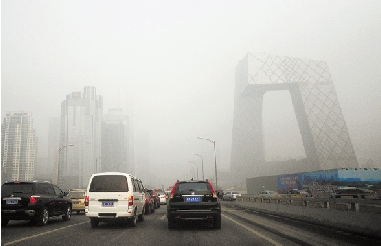China adopts new fuel standard
 0 Comment(s)
0 Comment(s) Print
Print E-mail China.org.cn, February 7, 2013
E-mail China.org.cn, February 7, 2013
The State Council on Wednesday issued a timetable for its program to upgrade fuel quality, aiming to implement a strict standard nationwide by 2017 in its latest bid to cut pollution.
The country will issue the "5th-phase" standard for automobile petrol, with sulphur content within 10 ppm (parts per million), before the end of the year. There will be a grace period until late 2017, according to an executive meeting of the State Council chaired by Premier Wen Jiabao. When a grace period comes to an end, it means the standard will be in practice nationwide, Xinhua reported.
 |
|
Prolonged smog shrouded many parts of the country, including Beijing in January. [File photo] |
Beijing is the only city in China to have adopted such a standard, equal to Europe's Euro V vehicle emissions cap of sulphur content below 10 ppm.
The "5th-phase" standard for automobile diesel, with sulphur content within 10 ppm, will come before June this year, with a grace period before the end of 2017, the statement said. The "4th-phase" standard for automobile petrol, namely no more than 50 ppm of sulphur content, has already been issued.
According to the statement, the General Administration of Quality Supervision, Inspection and Quarantine and the Standardization Administration will soon issue the "4th-phase" standard for automobile diesel with sulphur content within 50 ppm and the transitional time will expire at the end of 2014.
Domestic oil refiners should upgrade their equipment to ensure that they can provide qualified products following the timetables, it said, adding that more efforts should be made to step up research on automobile engines.
Gas prices should be fixed properly and subsidies should be given to disadvantaged people and non-profit organizations, the statement continued.
The Sinopec Corp. said last week it is upgrading desulphurization facilities and will supply cleaner oil products that meet national standards for pollutant emissions in 2014.
China's developed regions, including Shanghai, Jiangsu and Zhejiang, use the national "4th-phase" standard of 50 ppm or below, while the remaining regions have adopted the national "3rd-phase" standard, which allows the sulphur content of fuel to be as high as 150 ppm.
But cleaner fuel may also mean higher prices. When Beijing and Shanghai switched from the national "3rd-phase" standard to the stricter national "4th-phase" one five years ago, petrol prices rose by 0.2 to 0.3 yuan ($0.03 to 0.05) per liter.
The possibility of price hikes has stirred much discussion about who will bear a rise in petrol prices, which are already held by many to be too high.
"The statement shows that the gas price hikes will be shared by the government, enterprises and consumers together," according to Gao Shixian, a researcher with the Energy Research Institute under the National Development and Reform Commission.
"Environmental protection is a public issue and it is reasonable for the government to provide certain compensation so that nobody shoulders the pressure alone," said Wang Zhen, deputy head of the China University of Petroleum's China Energy Strategy Research Institute.






Go to Forum >>0 Comment(s)